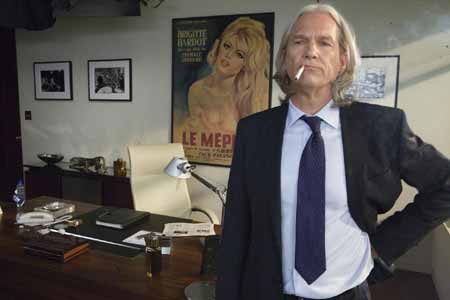|
Click here to return to the main site. Jeff Bridges - How to Lose Friends & Alienate People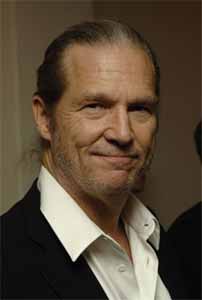 Four-time Academy Award nominee Jeff Bridges was born in Los Angeles on 4 December 1949. He has starred in numerous box office hits including Seabiscuit, The Fisher King, The Fabulous Baker Boys, The Jagged Edge, Fearless and American Heart. He scooped Oscar nominations for The Last Picture Show (1971), Thunderbolt & Lightfoot (1974), Starman (1984) and The Contender (2000), while he is known the world over for his performance as The Dude in The Big Lebowski. More recently he featured in his first-ever big-budget action picture, Iron Man. Reviewgraveyard.com caught up with Bridges as his movie How to Lose Friends and Alienate People, in which he stars as magazine editor Clayton Harding in the adaptation of Toby Young’s best-selling memoir, was released on Blu-ray and DVD... Reviewgraveyard: You are a good friend of How to Lose Friends and Alienate People director Bob Weide. Had you come close to working together before? We got along very well creatively, but I lost the project. We’d worked on it for many years but we could never get the money for the thing, which I couldn’t understand because it’s a great story. So then someone with a lot of money picked it up and we’ll probably see a great movie one day. Anyway, working together I got really turned onto Bob’s talents - he’s a wonderful documentary-maker, and of course there’s all his great work on Curb Your Enthusiasm. RG: So did working on this film with Bob live up to your expectations? JB: It’s always fun to work with people you like, your buddies, and there’s an element of play in anything that I do. Really, my life is like playing ‘pretend’ as a kid, but now I’m grown up, so I have all the fun clothes and toys. Plus, the film had a really great cast; I loved working with Simon Pegg, and, of course, Danny Huston, who’s a good friend of mine. RG: Having friends around you must have made the set a fun place to be... JB: Oh yeah, in fact we played this game a lot. I like to play this game when I’m on set called ‘Pass the Pigs’. It’s a children’s game, like ‘craps’ for kids, where you roll these little pigs and you get different scores depending on how they land. As you know, I’m a keen photographer, I’m always snapping away on set, and I think I’ve got quite a few of us all playing Pigs! RG: How would you describe your character in the film, Clayton Harding?
It served him well, professionally; he developed the magazine called Snipe, and he became Simon’s character’s hero. Then as Clayton got more involved in ‘Society’, hanging out with people he used to send up, he starts to lose his edge and becomes part of the clique that he was once critiquing. He misses having that edge - like missing his youth - and sees a bit of himself in Simon’s character, so they develop this love/hate relationship. RG: I’ve heard that Bob and the producers saw an echo of the real Jeff Bridges in the character, the rebel who’s conformed. Did you discuss that with them? JB: No, I’ve not heard that actually, but in being an actor, it’s great to play the gamut of emotions and personalities. That’s a fun thing to do - one moment to be The Dude, and in the next film to be the President of the United States, and then in the next one be a carcass of a rocker, in Terry Gilliam’s Tideland. So I like going back and forth, switching between the realms of funk and finery, if you will. RG: Did you think that the film felt very close to Toby Young’s book in tone and character? JB: It’s quite a bit different in tone, although the essence is the same, although I didn’t model myself on [Vanity Fair editor] Graydon Carter. The book is based on Toby’s real dealings with him in an actual real-life situation. I took little bits from what I’d gleaned about Graydon’s character, but I didn’t shadow him around the office. RG: You mentioned working with Simon Pegg. Can you see a big future for him in Hollywood?
RG: Speaking of conventions, Lebowski Fest is looming in San Francisco. I understand you’ve been to at least one... JB: I went to one maybe a year or two ago in Los Angeles. These two guys, Will and Scott, were at some convention and were having a really boring time, so they decided to think of a new convention that would be really fun. So they came up with Lebowski Fest, which has been going on a couple of years now, all over the States. It’s two days of bowling, music, heavy partying, and all these people are dressed up. You see some of the most obscure references, and the movie plays on the walls all the time. When I attended, I got a little band together and played, unannounced. I consider it my Beatles moment. I came out and played to this sea of Dudes! It was fun. I hope to return and do some tunes with John Goodman. We’d love to do that, one day! RG: You’ve played so many roles over the years, but only one has spawned a convention. Do you feel as though people love The Dude most of all? JB: I don’t think of it that way. I was nominated for an Academy Award for playing a President, which is about as un-Dude as you can get Then Iron Man, too, was very un-Dude-like. I love to shake it up and keep my own persona slightly confusing. That way people will be able to slip me into the character at hand. RG: Mentioning Iron Man, that’s really your first big action blockbuster. Why did you take that role?
The big draw for me with Iron Man was [director] John Favreau. I got the script and wasn’t sure I wanted to do it, but when I heard than John was involved, well, I was a big fan of his from Swingers and I’d been following his career ever since. I thought that was an odd combination, to have John Favreau directing a big comic book movie, and I found that so intriguing. Then I took a meeting with John and his pitch made it clear that this was to be very different from other comic book movies. And when he told me he had Robert Downey Jr and he was going to be Iron Man himself, I thought that’d be wonderful. He had a very hard time convincing the powers that be that Robert was the right man, but he was such a wonderful offbeat choice. So those two guys were the main draw for me. RG: This year seems busy for you, but over the last couple of years you’ve made fewer movies. Why was that? JB: I spend a lot of time trying to resist doing anything, really! Honestly, there are a lot of things I love to do other than making movies, and I know that once I commit to a film it’s going to prevent me from doing any of these other things. So I do try and not commit; I try hard not to engage. But sometimes there’s an element in it - like with those two guys in Iron Man - which I just can’t resist. I couldn’t pass that up. It changes with each movie. You can just get a feeling, and you don’t know what that is until you do the movie. RG: And now you’ve signed up for a Tron sequel, 25 years after the first film...
Doing the teaser trailer, which we did for Comic-Con, I had my first experience of Motion Capture. And that’s turning the industry on its head. It’s amazing being part of that. RG: There’s such a retro love for Tron. How do you bring it up to date? JB: It’s so amazing. Back when we made Tron there was no Internet, no cell-phones. But now we have Motion Capture, so I think we’ll get a far more successful version of the story, which is someone literally getting sucked into a video game. Like when we did King Kong in the ’70s, one minute you’d have a shot of Rick Baker in this big suit and then you’d cut to this 80-foot stiff model, and they looked nothing alike. Compare to that Peter Jackson’s King Kong. Now the technology is there and they did a really wonderful job. I thought they created a beautiful Kong. So I hope that’ll be the same for Tron. RG: You recently shoot Crazy Heart... JB: We’re shoot that with Maggie Gyllenhaal and Colin Farrell, and T-Bone Burnett, my great friend, is did the music. I get to play a country singer - and T-Bone and me go way back, to Heaven’s Gate - so this was an easy one to say "Yes" to. I get to play a little music in the movie, too, which is great. I also just finished The Open Road with Justin Timberlake. It’s a bit of a road trip movie. I hope you see it. RG: Thank you for your time.
How to Lose Friends and Alienate People is available on Blu-ray and DVD from Paramount Home Entertainment from 16 March 2009. Click here to buy this movie on Blu-ray for £14.98 (RRP: £24.99) Return to... |
|---|
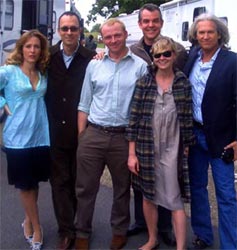 Jeff Bridges: Yeah. Many years before I was working on adapting the children’s book, The Giver, into a movie, and we were looking for writers. I then saw an adaptation of a Kurt Vonnegut book, Mother Night, which Bob had done and which they made into a movie with Nick Nolte. And Kurt Vonnegut, for me, is a very difficult writer to adapt for a movie, yet Bob had done such a brilliant job. So I thought he’d be good for another difficult task, The Giver, and we worked on that together for a while, but unfortunately it didn’t work out for either of us.
Jeff Bridges: Yeah. Many years before I was working on adapting the children’s book, The Giver, into a movie, and we were looking for writers. I then saw an adaptation of a Kurt Vonnegut book, Mother Night, which Bob had done and which they made into a movie with Nick Nolte. And Kurt Vonnegut, for me, is a very difficult writer to adapt for a movie, yet Bob had done such a brilliant job. So I thought he’d be good for another difficult task, The Giver, and we worked on that together for a while, but unfortunately it didn’t work out for either of us.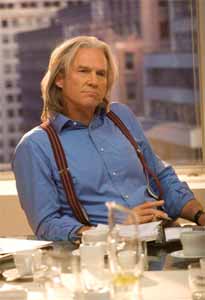 JB: Clayton is a fellow who was very like Simon Pegg’s character, when he was of a similar age. He was snubbed by ‘Society’, and being a witty guy he used that snub to fuel his attack on ‘Society’ in a very funny way.
JB: Clayton is a fellow who was very like Simon Pegg’s character, when he was of a similar age. He was snubbed by ‘Society’, and being a witty guy he used that snub to fuel his attack on ‘Society’ in a very funny way.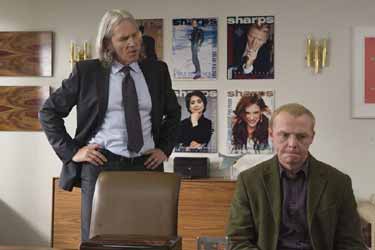 JB: I think so. I’ve loved all the films of his I’ve seen, and he does a terrific job of committing to the character. I think he’s a great actor and has a lot more besides what he’s shown us so far. He’s a writer, a musician, and has a very serious side as well. I look forward to his career. He’s doing the Star Trek movie now I believe. He will soon be at those Star Trek conventions.
JB: I think so. I’ve loved all the films of his I’ve seen, and he does a terrific job of committing to the character. I think he’s a great actor and has a lot more besides what he’s shown us so far. He’s a writer, a musician, and has a very serious side as well. I look forward to his career. He’s doing the Star Trek movie now I believe. He will soon be at those Star Trek conventions.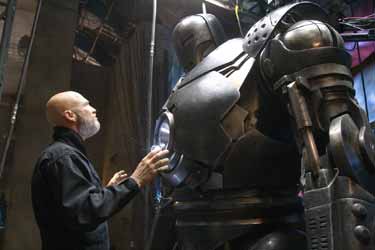 JB: Yeah, even King Kong wasn’t really a blockbuster.
JB: Yeah, even King Kong wasn’t really a blockbuster. 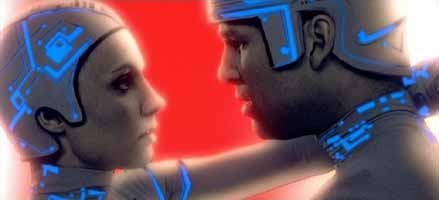 JB: Yeah, and that’s another unique, wild experience that was too good to turn down. Engaging in that world again feels just like it did all that time ago. Basically, I’m still a child, I love being childlike, and here was another chance to play with these crazy toys; I get sucked right in. And with the cutting-edge technology, it makes it exciting.
JB: Yeah, and that’s another unique, wild experience that was too good to turn down. Engaging in that world again feels just like it did all that time ago. Basically, I’m still a child, I love being childlike, and here was another chance to play with these crazy toys; I get sucked right in. And with the cutting-edge technology, it makes it exciting.